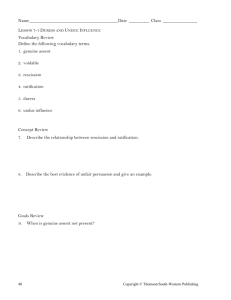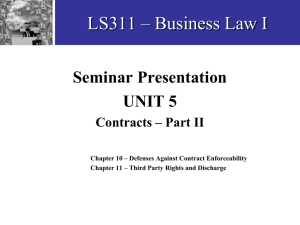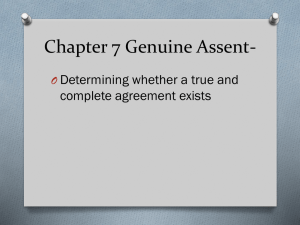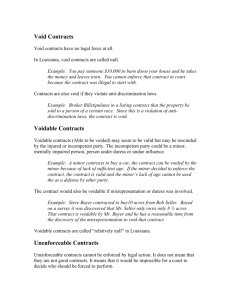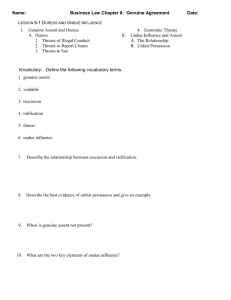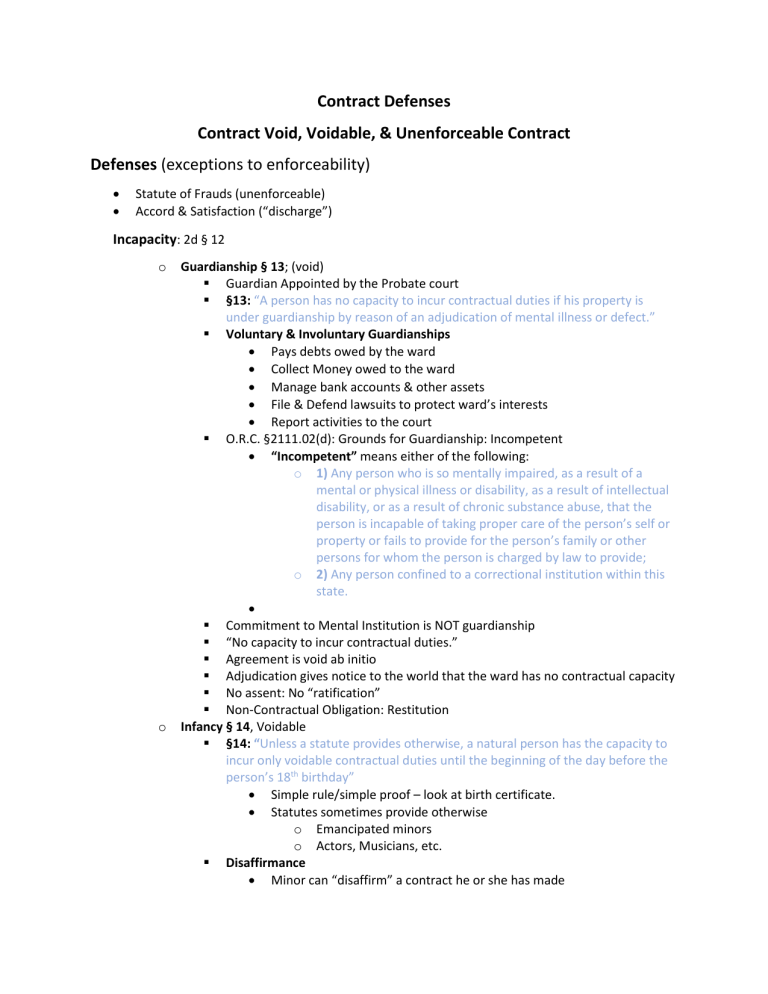
Contract Defenses Contract Void, Voidable, & Unenforceable Contract Defenses (exceptions to enforceability) Statute of Frauds (unenforceable) Accord & Satisfaction (“discharge”) Incapacity: 2d § 12 o o Guardianship § 13; (void) Guardian Appointed by the Probate court §13: “A person has no capacity to incur contractual duties if his property is under guardianship by reason of an adjudication of mental illness or defect.” Voluntary & Involuntary Guardianships Pays debts owed by the ward Collect Money owed to the ward Manage bank accounts & other assets File & Defend lawsuits to protect ward’s interests Report activities to the court O.R.C. §2111.02(d): Grounds for Guardianship: Incompetent “Incompetent” means either of the following: o 1) Any person who is so mentally impaired, as a result of a mental or physical illness or disability, as a result of intellectual disability, or as a result of chronic substance abuse, that the person is incapable of taking proper care of the person’s self or property or fails to provide for the person’s family or other persons for whom the person is charged by law to provide; o 2) Any person confined to a correctional institution within this state. Commitment to Mental Institution is NOT guardianship “No capacity to incur contractual duties.” Agreement is void ab initio Adjudication gives notice to the world that the ward has no contractual capacity No assent: No “ratification” Non-Contractual Obligation: Restitution Infancy § 14, Voidable §14: “Unless a statute provides otherwise, a natural person has the capacity to incur only voidable contractual duties until the beginning of the day before the person’s 18th birthday” Simple rule/simple proof – look at birth certificate. Statutes sometimes provide otherwise o Emancipated minors o Actors, Musicians, etc. Disaffirmance Minor can “disaffirm” a contract he or she has made o o o o o Before 18th birthday Within a reasonable time of 18th birthday Meaning: could buy a car at 17, wreck it, and get out of the contract WITH a refund of the money you paid for it, as long as you return the car in its present, wrecked, condition. Remedy upon Disaffirmance o Eliminate Obligation to Perform o No Obligation for benefits received o Obtain refund of sums paid o Supply Restitution to the other Party Benefits remaining in minor’s possession Halbman v. Lemke, 298 N.W.2d 562 (Wis. 1980) Liability Ratification after turning 18 “majority” o Express Ratification o Implied Ratification Making a payment: Fletcher v. Marshall Continued use of the Benefits of the contract Restitution for “Necessities” of Life o Food, Shelter, and Clothing o Emergency Medical Care “Voidable Contractual duties” Voidable at election of the person suffering from the incapacity Ratification possible when incapacity ends Non-Contractual Obligations: Restitution Mental Illness or Defect § 15, Voidable §15(1)(a): Voidable If (cognitive test) By reason of mental illness or defect o Person is unable to understand in a reasonable manner the nature and consequences of the transaction (b) Voidable if (volitional test) o By reason of mental illness or defect o Unable to act in a reasonable manner in relation to the transaction o Other party has reason to know of his or her condition “Voidable Contractual duties” Voidable at election of the person suffering from the incapacity Ratification possible when incapacity ends Non-Contractual Obligations: Restitution Intoxication § 16 Voidable A person incurs only voidable contractual duties by entering into a transaction if the other party has reason to know that by reason of intoxication o (a) he or she is unable to understand in a reasonable manner the nature and consequences of the transaction; or o (b) he or she is unable to act in a reasonable manner in relation to the transaction Alternative Standards o Cognitive o Volitional both of these are reasons to know. “Voidable Contractual duties” Voidable at election of the person suffering from the incapacity Ratification possible when incapacity ends Non-Contractual Obligations: Restitution Liability Despite Incapacity o Ratification after Incapacity Ends Incapacity Ends Minor turns 18 Guardianship Terminated or Abandoned Mentally Impaired Person Recovers Drunk Sobers up Ratification: Express: Words Implied: Actions o Restitution Liability for Necessities of Life Food, Shelter, Clothing Emergency Medical Care Mistake: o Mutual Mistake o Unilateral Mistake Improper Means of Obtaining Assent o Misrepresentation, concealment, * nondisclosure o Duress: physical compulsion & improper threats o Undue Influence Violation of Public Policy (Illegality)(Usually Void) Unconscionability (Unenforceable) Changed Circumstances: (Discharge) o Impossibility o Impracticability o Frustration of Purpose Void vs. Voidable Void: “Void ab initio” – from the outset o No legal effect o Not enforceable be either party o “Void Contract” is a misnomer – Contract = Promise the law will enforce or law recognizes as a duty § 1 No enforcement/duty = Not a contract Voidable: “One or more of the parties have the power, by manifestation of an election to do so, to avoid the legal relations created by the contract, or by ratification of the contract, to extinguish the power of avoidance” §7 o Creates a duty unless avoided o Right to avoid can be eliminated by “ratification” Unenforceable Contract Contract: Promise for the breach of which the law o Gives a remedy (usually damages) o Or the performance of which the law in some way recognizes as a duty Unenforceable §8 o An unenforceable contract is one for the breach of which neither the remedy of damages nor the remedy of specific performance is available, but which is recognized in some other way as creating a duty of performance, though there has been no ratification. Statute of Frauds: Unenforceable o But recognized as a duty o Signed writing makes it enforceable o Might be “voidable” if one of the parties lacks capacity Unenforceable: Tort = Intentional Interference. Mistake §151 – “A belief that is not in accord with the facts.” - Distinguish Among: o Mistake: False Belief o Bad Prediction o Opinion (something that isn’t true or false) Mutual Mistake §152 Mistake by both parties “Where a mistake of both parties at the time a contract was made as to a basic assumption on which the contract was made has a material effect on the agreed exchange of performance, the contract is voidable by the adversely affected party unless he bears the risk of the mistake under §154 Comment C: “Not enough to prove that he would not have made the contract had it not been for the mistake (basic assumption) Must show that the resulting imbalance in the agreed exchange is so severe that he cannot fairly be required to carry it out. §154: Bearing the Risk of a Mistake A party bears the risk of a mistake when a) The risk is allocated to him by agreement of the parties b) He is aware, at the time the contract is made, that he has only limited knowledge with respect to the facts to which the mistake relates but treats his limited knowledge as sufficient; or c) The risk is allocated to him by the court on the ground that it is reasonable in the circumstances. Test/Elements: 1. Basic assumption; o The house is worth $200,000 2. The mistake must have a material effect on the exchange; and o The house is actually worthless 3. The harmed party must not bear the risk of the mistake. o Person seeking relief must not bear the risk – the seller does not have an “as-is” clause in the contract. Unilateral Mistake §153 Mistake by One party To avoid the contract, have to prove mutual mistake PLUS: either 1. The effect of the mistake is such that enforcing the contract would be unconscionable; OR 2. The other Party a. Has reason to know of the Mistake; or b. Other party’s Fault Caused the Mistake. Mistake in Integration & Misunderstanding Mistake in Integration §155 “Integration” – Inclusion of the Entire Agreement in a Signed Writing Parol Evidence Rule will restrict evidence from outside the written contract “Scrivener’s Error” – Parties agreed on terms, but wrote it down wrong o $10,000 instead of agree $100,000 o Land Description in Real Estate Deal. o Life Insurance Policy “When a writing that evidences or embodies an agreement in whole or in part fails to express the agreement because of a mistake of both parties as to the contents or effects of the writing, the court may at the request of a party form the writing to express the agreement, except to the extent that rights of third parties such as good faith purchasers for value will be unfairly affects.” Misunderstanding §20 Parties use the same words, but attribute different meanings to them. Differences in interpretations. 1. There is no manifestation of mutual assent to an exchange if the parties attach materially different meanings to their manifestations and a. neither party knows or has reason to know the meaning attached by the other; or b. each party knows or each party has reason to know the meaning attached by the other. 2. The manifestations of the parties are operative in accordance with the meaning attached to them by one of the parties if a. that party does not know of any different meaning attached by the other, and the other knows the meaning attached by the first party; or b. that party has no reason to know of any different meaning attached by the other, and the other has reason to know the meaning attached by the first party. Ex. Contract for the Sale of Cotton: Shipped from Bombay to Liverpool o To arrive on the ship “Peerless” o Two ships names Peerless on the Bombay to Liverpool route Buyer meant: October Boat Seller meant: December Boat Conscious ignorance – Where both parties agreed they did not know whether the assumptions were erroneous or not. Selling a safe where neither party knows what is inside. Assumption of Risk - Where one of the parties assumed the risk of being wrong Improper Ways of Obtaining Assent Misrepresentation §139: An assertion that is not in accord with the Facts 3 Types: 1. Affirmative Statement – Person making the representation makes an express, affirmative statement that is not in accord with the facts. 2. Concealing the Facts: §160 3. Failing to disclose Facts (if duty to disclose): §161 Misrepresentation of Fact Nearly always an assertion of fact, not opinion Comment c to §159 o “An assertion must relate to something that is fact at the time the assertion is made in order to be a misrepresentation. Predictions & Opinions Predictions can be statement of fact: o “This care will get 35 mils to the gallon” Implied that it is “capable” of getting that mileage Opinions can be a statement of fact: o Opinion is a “state of mind” o Current State of Mind is a fact o Lying about your actual opinion = misrepresentation Opinion = Assertion of Fact §168 (1) An assertion is one of opinion if it expresses only a belief, without certainty, as to the existence of a fact or expresses only a judgment as to quality, value, authenticity, or similar matters (2) If it is reasonable to do so, the recipient of an assertion of a person’s opinion as to facts not disclosed and not otherwise known to the recipient may properly interpret it as an assertion a. That the facts known to that person are not incompatible with his or her opinion b. That he knows facts sufficient to justify him in forming it. Opinions = Misrepresentation Under the right circumstances as statement of an opinion can be a misrepresentation o Statement of Market Value (as opposed to intrinsic value), especially if market value is readily ascertainable o Relationship of Trust & Confidence o Opinion by Person with Superior Knowledge o Parties otherwise not at “Arms Length” Fact & Opinion Misrepresentation is nearly always an assertion of fact, not opinion. Types of Misrepresentations Concealment = An Assertion: §160 o “Action intended or known to be likely to prevent another from learning a fact is equivalent to an assertion that the fact does not exist. Cmt: Concealment is an affirttmative act intended or known to be likely to keep another from learning of a fact of which he otherwise would have lkearned” It’s “always the equiavalent to a misrepresentation and has any effect that a misrepresentation would have under §163, 164, & 166 Ex. Rolling back the odometer on a car Paining over water damage Nondisclosure = Assertion o “Failure to Disclose” a fact can be treated as it it were an Asertion. §161 Non-disclosure of a fact known to a person is equivalent to an assertion that the fact does not exist… only where: (a) He knows that disclosure of the fact is necessary to prevent some previous assertion from being a misrepresentation or from being fraudulent or material (b) He knows that disclosure of the fact would correct a mistake of the other party as to a basic assumption on which that party is making the contract and if non-disclosure of the fact amounts to a failure to act in good faith and in accordance with reasonable standards of fair dealing (c) He knows that disclosure of the fact would correct a mistake… as to the contents or effect of a writing, evidencing or embodying an agreement in whole or in part. (d) The other person is entitled to know because of a relation of trust & confidence between the parties. Fraudulent or Material Misrepresentation Effect: Contract Voidable Misrepresentation might make a contract Voidable §164 A contract is Voidable by the Victim if: o The misrepresentation is Fraudulent or Material o Manifestation of Assent Induced by Misrepresentation o Reliance was Justified Voidable: §7 - A voidable contract is one where one or more of the parties have the power, by a manifestation of election to do so, to avoid the legal relations created by the contract, - Or by ratification of the contract to extinguish the power of avoidance o Remedies: Voidability; No Duty to Perform Rescission & Restitution Fraudulent Misrepresentation §162(1): A misrepresentation is fraudulent if the maker intends his or her assertion to induce a party to manifest his assent and the maker: o Knows it’s not true o Believes it’s not true o Lacks the degree of confidence stated or implied; or o Knows he lacks a sufficient basis for the assertion Falsity with Intent to Deceive o AKA “Scienter” o Not “innocent” nor even “negligent” Similar to the Tort of “Deceit” Statements of Financial Condition Material Misrepresentation A Misrepresentation is Material if o It would be likely to induce a reasonable person to manifest his assent; or o The maker knows that it would be likely to induce the recipient (victim) to manifest his or her assent Even a non-negligent misrepresentation of a material fact can give rise to grounds to rescind a contract due to misrepresentation. This is very, very similar to warranty. Strict Liability for o Negligent material misrepresentation o Completely innocent material misrepresentation Similar to breach of Warranty Material Misrepresentation is easier to prove than Fraudulent Misrepresentation Justified Reliance Induced by Misrepresentation Would not be justified reliance even if the evidence was readily obtainable. Inducement (a) If a party’s manifestation of assent is induced by either a fraudulent or a material misrepresentation by the other party upon which the recipient is justified in relying, the contract is voidable by the recipient §167: A misrepresentation induces a party’s manifestation of assent if it substantially contributes to his decision to manifest his assent Causation: “Substantially contributes” o Not necessarily the only cause o Nor the “predominant” factor Manifestation of Assent o Acceptance o Making an Offer o Refraining from Revoking an Offer Recipient’s Knowledge of Falsity: No inducement Duress One party’s assent is induced by an improper threat by the other party and the threatened party has no reasonable alternative other than to enter into the agreement. Makes a wrongful proposal Other party has no other choice but to go along. Physical Duress: o “No Assent = No Contract: §174 o “If conduct that appears to be a manifestation of assent by a party who does not intend to engage in that conduct t is physically compelled by duress, the conduct is not effective as a manifestation of assent.” o Ex. “A grasps B’s hand and compels B, by physical force, to write his name.” Contract is VOID not merely voidable. Verbal Duress §175 o “If a party’s manifestation of assent is induced by a improper threat by the other party that leaves the victim no reasonable alternative, the contract is voidable by the victim. Elements: (1) Manifestation of Assent (2) Induced by (3) Improper Threat (4) No Reasonable Alternative o Improper Threat: §176 (1) A threat is improper if: (a) What is threatened is a crime or a tort, or if the threat itself would be a crime or a tort if it resulted in obtaining property; 1. Ex. Al threatens to poison Barb unless she releases her rights to the painting. Barb, believing she has no reasonable alternative, agrees to do so. (b) What is threatened is a criminal prosecution; 1. Ex. Andy believe that his employee, Ben, has embezzles money from him, threatens Ben with criminal prosecution unless Ben signs a promissory note promising to pay Andy the money be embezzled to avoid formal charges (c) what is threatened is the use of civil process and the threat is made in bad faith; 1. Alice, who knows that her claim is invalid, threatens to bring a civil action against Bruce. Because she knows her claim is in bad faith, it’s duress, and voidable. (d) The threat is a breach of the duty of good faith and fair dealing under a contract with the recipient of the threat. 1. Amos in contract with Brittany to excavate a cellar. Threatens not to finish the job unless Brittany agrees to enter into ANOTHER contract with Amos for a cellar on another property she owns. o §176 (2) o A threat is improper if the resulting exchange is not on fair terms and (a) The threatened act would harm the recipient and would not significantly benefit the party making the threat; (b) The effectiveness of the threat inducing the manifestation of assent is significantly increased by prior unfair dealing by the party making the threat; and (c) What is threatened is otherwise a use of power for illegitimate ends. Economic Duress o Threat to commit a wrongful act (breach of contract) that would seriously harm the other party’s property or finances; and o There are no reasonable alternatives for the threatened party other than to give in to the threat. Reasonable Alternative: Substitutes Sue for Damages or Injunctions o Resulting delay of EITHER of these may make these alternatives impractical o Not usually a Defense Because there is economic pressure in every exchange “give me what I want or I won’t give you what you want” o Ex. Alaska Packers v. Domenico Crew demanded higher wages Captain had no alternative other than to give in to their demands, since they were already in the middle of the ocean. o Austin Instrument v. Loral Seller of critical parts refused to deliver them unless Buyer agreed to pay a higher price No reasonable alternative due to the unavailability of substitute parts in time to deliver radar equipment to the Nav. o Common Thread: Threat of Breach which took unfair advantage of the other party’s vulnerability leaving victim with no reasonable alternative. Undue Influence §177 One powerful party uses unsavory tactics That powerful party takes advantage of another, weaker person o Ex. Ben in hospital, Ali insurance company lawyer, comes to hospital at 10PM with 2 lawyers, badgering Ben to sign in order to get them to leave. (1) Undue Influence is unfair persuasion of a party who is under the domination of the person exercising the persuasion or who by virtue of the relation between them is justified in assuming that the person will not act in a manner inconsistent with his welfare Elements: Unfair Persuasion Victim is highly susceptible to this tactic because of Under the domination of the person exercising the persuasion Trusting and confidential relationship between the parties o Ex. At-will caregiver threatening to stop care unless person whom they care for gives caregiver the house in the will. (2) If party’s manifestation of assent is induced by under influence by the other party, the contract is voidable by the victim. (3) If a party’s manifestation of assent is induced by one who is not a party to the transaction, the contract is voidable by the victim unless the other party to the transaction in good faith and without reason to know of the undue influence either gives value or relies materially on the transaction. Justified Reliance v. Reasonable Reliance Slightly different, Reasonable Reliance or harder to establish No Justified Reliance if: o On an Obviously (patently) False Assertion o Means of detecting falsity is “readily at hand” o Parties have equal access to truth/falsity Fault Makes Reliance Unjustified: §172 o A recipient’s fault in not knowing or discovering the facts before making the contract does not make his reliance unjustified unless it amounts to a failure to act in good faith and in accordance with reasonable standards of fair dealings. Mere negligence is not enough to make reliance unjustified. Reliance on an Opinion §169 To the extend that an assertion is one of opinion only, the recipient is not justified in relying on it unless the recipient o (a) stands in such a relation of trust and confidence to the person who opinion is asserted that the recipient is reasonable in relying on it, or o (b) reasonably believes that, as compared with himself, the person whose opinion is asserted has special skill, judgment or objectivity with respect to the subject matter, or o (c) is for some other special reason particularly susceptible to a misrepresentation of the type involved. Public Policy & Unconscionability focus on the terms of the agree – some transactions are so unsavory that they should not be allowed to be enforced through the courts. Violation of Public Policy (Illegality) Prevents enforcement of harmful contracts Protects people or institutions outside of contract Public Policy §178 1. A promise or other term of an agreement is unenforceable on the grounds of public policy if legislation provides that it is unenforceable or the interest in its enforcement is clearly outweighed in the circumstances by a public policy against the enforcement of such terms. 2. In weighing the interest in the enforcement of a term, account is taken of a. The parties’ justified expectations, b. Any forfeiture that would result if enforcement were denied, and c. Any special public interest in the enforcement of the particular term. 3. In weighing a public policy against enforcement of a term, account is taken of a. The strength of that policy as manifested by legislation or judicial decisions, b. The likelihood that a refusal to enforce the term will further that policy, c. The seriousness of any misconduct involved and the extent to which it was deliberate, and d. The directness of the connection between that misconduct and the term. Illegal Contracts: subject matter of the contract is illegal or enforcement of the contract is otherwise contrary to public policy o Ex. o o o Restraint of Trade (price fixing; non-compete agreements) Gambling Contracts (in some states in some settings) Usery (rate of interest) Obstructing Justice: Contact to Commit Tort or Crime Contracts for an Illegal Purpose Agreement Affecting Certain Family Relationships Licensing Statutes Contract enforceable if licensing law merely raises revenue (license to do business) Unenforceable if law’s purpose is public protection Unauthorized practice of law Construction Contract by unlicensed builder §195 Term Exempting from Liability for Harm Caused Intentionally, Recklessly, or Negligently. 1. A term exempting a party from tort liability for harm caused intentionally or recklessly is unenforceable on grounds of public policy. 2. A term exempting a party from tort liability for harm caused negligently is unenforceable on the grounds of public policy if a. The term exempts an employer from liability to an employee for harm in the course of his employment. b. The term exempts one charged with a duty of public service from liability… for breach of that duty, or c. The other party is similarly a member of a class protected against the class to which the first party belongs. 3. A term exempting a seller of a product from his special tort liability for physical harm to a user or consumer is unenforceable on grounds of public policy unless the term is fairly bargained for and is consistent with the policy underlying that liability. Test: o (1) Can parties reasonably expect the contract to be legally binding? o (2) Weigh public interest (blocks the formation of the contract to sell drugs) o Harder cases: Releasing of Tort Liability & Surrogacy agreements. Unconscionability §208 - If a contract or term thereof is unconscionable at the time the contract is made a court may refuse to enforce the contract, or may enforce the remainder of the contract without the unconscionable term, or may so limit the application of any unconscionable term so as to avoid any unconscionable result. - Identifies court’s alternatives: o Refuse to enforce the contract o Enforce the reminder of the contract without the unconscionable term o Limit the application of any unconscionable term to avoid an unconscionable result. Test: 1. An absence of meaningful choice on the party on the party of one the parties 2. Contract terms which are unreasonably favorable to the other party. Based on an “equitable” defense based on a combination of: o Procedural flaws in the bargaining process o Substantive Unfairness Prevents courts from enforcing immoral bargains Asks whether the bargain “shocks the conscience” o Substantive or o Procedural Modern Version: 2 Prongs: Substantive Unconscionability o Terms that are unreasonably favorable to one party - like sometimes, depending on the circumstances Arbitration Clauses Forum Selection Clauses High Price Restriction on Damages for Personal Injury o Substance of the contract o No reasonable person would ask for or agree to the terms Because it is overly harsh or one-sided Ex. A ridiculously high interest loan. Procedural Unconscionability o Absence of reasonable choice on the part of one of the parties o How a contract was formed o Prevent oppression and unfair surprise Like tiny print that you can’t read in the contract Offering a deal on a “take it or leave it” basis is NOT procedurally unconscionable. Sliding Scale Approach – o The more substantially oppressive a contract term is, the less procedurally oppressive it has be in order to render the contract unconscionable – and vise versa. UCC 2-302 on Unconscionability 1. If the court as a matter of law finds the contract or any clause of the contract to have been unconscionable at the time it was made, the court may refuse to enforce the contract, or it may enforce the remainder of the contract without the unconscionable clause, or it may so limit the application of an unconscionable clause as to avoid any unconscionable result. 2. When it is claimed or appears to the court that the contract or any clause thereof may be unconscionable the parties shall be afforded reasonable opportunity to present evidence as to its commercial setting, purpose and effect to aid the court in making the determination. 2-302 permits courts to “police explicitly against unconscionable contracts or clauses” Basic Test: - Whether, in light of the general commercial background and commercial needs of the particular trade or case, the clauses involved are so one-sided as to be unconscionable under the circumstances existing at the time of the making of the contract. Comments mention that “it is proper for the court to hear evidence upon those questions.” The principle is one of the preventions of o Oppression o & Unfair Surprise o And not of disturbance of allocation of risks because of superior bargaining power. Sidenote: Federal law’s affect the enforceability of an arbitration clause: States may not prohibit arbitration clauses nor may they subject them to different unconscionability standards than other contract provisions. Changed Circumstances §261-272 (must be dramatically changed) - Event that occurs “after a contract is made” – §261 2 types 1. Impracticability §261 Elements: After a contract is made - Performance is made Impracticable Occurrence of an Event (after the contract is made) Non-Occurrence was a Basic Assumption Event not the Fault of the Party Seeking Relief Unless Language or the Circumstances Indicate Otherwise Assuming the risk in the contract a. When performance becomes burdensome or expensive i. More expensive ii. Unprofitable iii. impracticable Occurrence of these Events is treated as a Basic Assumption Types of Events: Bankruptcy or Unavailability of Critical Suppliers or Resources o Reduces supply War or Insurrection: Invasion Compliance with Government Regulation Fire, Floods, Tornadoes, Hurricanes Pandemics Transportation Disruption Electric Blackout Depression, Recession Basic Assumptions Restatements Comments provide Guidance o “Basic Assumption on which both parties made the contract” (Comment b to §261) o Cont’d existence of a person or thing is ordinarily a basic assumption Shifts in market value: usually NOT a basic assumption “The fact that the event was foreseeable, or even foreseen, does not necessarily compel a conclusion that its non-occurrence was not a basic assumption” Examples in illustrations 1-4 in 2d §261 Language or Circumstances Language in the contract, or surrounding circumstances may indicate that one of the parties either o Assumed the risk of the vent, or o Should bear the risk Construction Contracts o New Construction: builder has risk o Repair/Renovation: Owner has risk UCC §2-615 (statutory version of impracticability) Except so far as a seller may have assumed a greater obligation and subject to the preceding section on substituted performance: (a) Delay in delivery or non-delivery in whole or in party by a seller who complies with (b) and (c) is not a breach of his duty under a contract for sale if performance as agreed has been made impracticable by the occurrence of a contingency the non-occurrence of which was a basic assumption on which the contract was made or by compliance in good faith with any applicable foreign or domestic governmental regulation or order whether or not it later proves to be invalid. (b) Where the causes mentioned in (a) affect only a part of the seller’s capacity to perform, he must allocate production and deliveries among his customers but may at his option include regular customers not then under contract as well as his own requirements for further manufacture. He may so allocate in any manner which is fair and reasonable. (c) The seller must notify the buyer seasonably that there will be delay or non-delivery and, when allocation is required under (b), of the estimated quota thus made for the buyer. Impossibility Traditional Rule: Performance Impossible o Impracticable if Impossible o §262: Death or Incapacity of Person who is Necessary for Performance of a Duty Lady gaga was supposed to sing the national anthem – dies – excused from performance. NOT necessary Kevin contract to dig a hole in your yard o §263: Destruction of a “Thing Necessary for Performance” UCC §2-613 “Casualty to Goods identified when the contract is made” building might burn down satisfies the Event part of §261 o §264: Prevention by Government Regulation or Order Satisfied impracticability element of §261 o Impossibility of performance Death of Person Necessary for Performance: §262 Destroyed or Deterioration of Things Necessary for Performance §263 Casualty to Goods Identified at the time the Contract was made that are necessary for performance: 2-613 Government Regulation: §264 Ex. Ali agrees to rent music hall to Claire, but it burns down. Casualty to Identified Goods: UCC 2-613 Similar to §263 - Where the contract requires for its performance goods identified when the contract is made, and the goods suffer casualty without fault of either party before the risk of loss passes to the buyer, or in a proper case under a “no arrival, no sale” term (section 2-324) then (a) if the loss is total the contract is avoided; and (b) if the loss is partial or the goods have so deteriorated as no longer to conform to the contract the buyer may nevertheless demand inspection and at his option either treat the contract as avoided or accept the goods with due allowance from the contract price for the deterioration or the deficiency in quantity but without further right against the seller. So, seller is excused from contract if goods were destroyed in transit, when it was not their fault, when the specific goods were identified at the time the contract was made, and those goods were necessary for performance. Narrow rule with important limitations: only for goods identified at the moment when the contract was made (that exact painting, that exact machine, a used car) - Most goods are not “identified” to the contract when the contract is made – usually happens later. - Sometimes they are, but those specific items are not “required” for performance o An identical item could be conforming enough Risk of Loss: Shipment Contract: 2 – 509(1)(a) o Risk of loss passes to the buyer when the goods are tendered from the seller, to the carrier/deliverer. Destination Contract 2-509(1)(b) o Seller responsible for goods until they are delivered to a particular destination. Shipment Contract is usually default if not specified. Goods held by a bailee to be delivered without being moved: 2-509(2)(a)-(c): Complicated rules involving use of warehouse receipts Warehouse receipts (and bills of lading) governed by UCC Article 7 All other cases: 2-509(3) If seller is a merchant: risk passes on buyer’s receipt Seller not a merchant: risk passes when on seller’s “tender of delivery” 2. Frustration of purpose a. When something becomes less valuable to one of the parties than it initially would have been. Ex. Ali promises to rent a penthouse to Blair for 1 day to watch the fireworks, but the fireworks get cancelled. Blair could get out of the contract because she would not longer get the main thing that the contract would give her – the view of the fireworks. Elements: Occurrence of an Event Non-Occurrence was a Basic Assumption Event not Caused by Party Seeking Relief The Parties’ Principal Purpose is Substantially Frustrated (had to be shared purpose) Unless Language or the Circumstances Indicate Otherwise. “Substantially Frustrated” - One country’s governmental regulations prevent buyer from important goods into one country might not substantially frustrate the buyer from using or reselling them elsewhere in the world. - Lloyd v. Murphy: use of a building as a new auto dealership and repair shop not substantially frustrated by WWII restrictions on new car sales when tenant could continue to repair cars. Principal Purpose: Whose Purpose? - Contemplated Purpose
